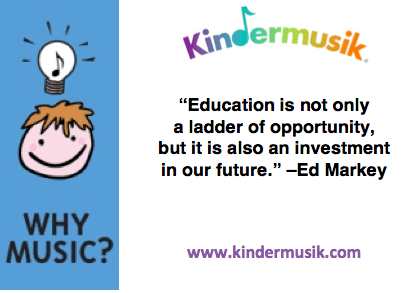 We talk a lot about early childhood education around here. We know—as Ed Markey said: “Education is not only a ladder of opportunity, but it is also an investment in our future.” Children, especially those most at-risk students, receive even more benefits from participating in an early childhood curriculum that prepares them for a lifetime of learning!
We talk a lot about early childhood education around here. We know—as Ed Markey said: “Education is not only a ladder of opportunity, but it is also an investment in our future.” Children, especially those most at-risk students, receive even more benefits from participating in an early childhood curriculum that prepares them for a lifetime of learning!
In a perfect world, early childhood education involves three key ingredients: the child, the teacher, and family involvement in education. Without all three, our investment in early childhood education—and the child—does not yield the biggest returns—measurable and immeasurable.
Of course, a parent is a child’s first and most important teacher. We say that time and time again. When a child attends a preschool, daycare, or other learning environment outside the home, family involvement in education remains a pivotal part of the process. While teachers, administrators, and parents share the common bond of the child, some programs more successfully manage to engage this learning community by promoting respectful and reciprocal caring relationships. What can we learn from those who do it really well?
Getting high marks in family involvement in education
Anne Douglass, PhD., at the University of Massachusetts in Boston wanted to find the

answer. She recently researched ways to increase parental involvement in early childhood education in a daycare or preschool setting. She wanted to answer:
- What accounts for the gap between the desire of the early childhood education programs to partner with families and actual practices with families?
- What do teachers of early childhood curriculum need to effectively partner with families?
- What factors promote or impede the implementation of family support and engagement strategies?
In this small study, Douglass compared the teachers and parents, structures, and processes within four early childhood education programs: two with “high quality” family involvement and two with “low quality.” She found two distinctive characteristics of successful preschools, Head Start programs, and daycares with parent involvement in early childhood education:
- Administrators modeled caring professional relationships and shared power within the school, which included leadership opportunities for classroom teachers, training, and staff appreciation.
- The preschool utilized specific structures to promote caring and shared power, including teacher supervision that intentionally involved discussing multiple perspectives in solving a problem.
An early childhood curriculum that increases parental involvement in early childhood education
 ABC Music & Me uses music and movement to teach young children early literacy and language, social and emotional skills, and other vital skills proven to help set a child up for success. We intentionally created ABC Music & Me to include resources for teachers and parents that increase family involvement in education. As Douglass’s study indicates, teacher training impacts not only a teacher’s ability in the classroom but also the engagement of children’s parents. Our early childhood curriculum includes teacher training choices from half-day trainings to demonstration DVDs. We also include access to materials for families to use together at home that supports both the classroom learning and a parent’s role as a child’s first and best teacher.
ABC Music & Me uses music and movement to teach young children early literacy and language, social and emotional skills, and other vital skills proven to help set a child up for success. We intentionally created ABC Music & Me to include resources for teachers and parents that increase family involvement in education. As Douglass’s study indicates, teacher training impacts not only a teacher’s ability in the classroom but also the engagement of children’s parents. Our early childhood curriculum includes teacher training choices from half-day trainings to demonstration DVDs. We also include access to materials for families to use together at home that supports both the classroom learning and a parent’s role as a child’s first and best teacher.

